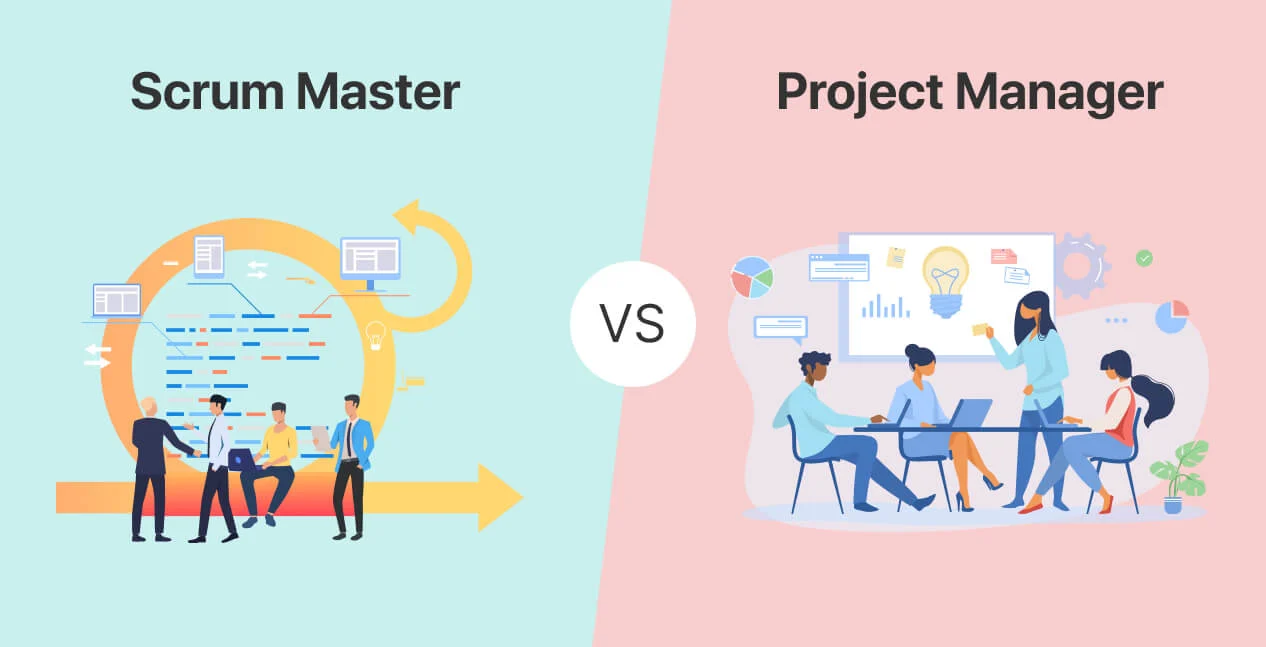-
Scrum Master and Project Manager
-
What is Scrum?
-
What a Scrum Master doesn’t do?
- Role of a Project Manager
- What a Project Manager doesn’t do?
-
Highlighting the differences between a project manager vs scrum master
- Scrum Master vs Project Manager Certification: A Comparative Analysis
-
Closing Thoughts on Project Manager vs. Scrum Master
Scrum Master and Project Manager
Scrum Master and Project Manager profiles are quite distinct though most of the people get confused. There could be many tasks that overlap with one another, however, both the roles are quite different. Let’s get into the details of these profiles to understand what they really do.
What is Scrum?
Scrum is a framework that helps teams to encourage self organization and generate effective solutions against complex issues. Its lessons can be applied to all types of teams and describes roles, meetings as well as tools that help to structure and manage teams. The main objective of Scrum is to satiate customer’s needs by building communication transparency, continuous progress and collective responsibility.
This lightweight framework is easier to understand and helps organize projects via teams that are cross-functional. Scrum guides the product creation and focuses on value and high visibility. It is executed in short and periodic blocks known as sprints. The process has a starting point and a list of objects that make the project plan. Scrum is usually used in software development but industries like marketing, sales and etc., are also using this methodology rigorously.

The scrum team focuses on building bigger and complex solutions, therefore, have tasks assigned to different roles. Here are those profiles which make a scrum team.
Scrum Master – is an individual who leads the scrum team and works on eliminating any impediments in the project. A Scrum Master helps clients to maximize their ROI and mentors, trains and coaches team members for team improvement.
Product Owner – a scrum product owner is a primary stakeholder who has a good knowledge of competitors, users, marketplaces, etc. This person is the one who visualizes the product’s future and is responsible for the product backlog.
Developers – are responsible for the project development and have the required technical skills to develop the product.
Scrum Master is an individual that collaborates with the product owner and the developers. Some of the responsibilities that a Scrum Master takes care of are –
- Organizing the daily scrum meetings
- Leads sprint planning
- Monitoring sprint progress
- Improving and monitoring team dynamics
- Coaching members
- Motivating the team
- Holding the team together
- Reduce team disruptions
What a Scrum Master doesn’t do?
Scrum master isn’t a sole decision-maker: The Scrum Master apparently has a self-managed team that is capable of taking good decisions collectively to deliver best results. Their opinion brings more weightage while taking crucial decisions.
Don’t act like a Project Manager: Project managers are responsible for directing the team, creating reports, collecting work status and co-ordinate with the stakeholders. However, a Scrum Master brings a different perspective to the table.
Team secretary: Scrum Masters are often misinterpreted as team’s secretary because they at times overhelp team mates. The development team must be able to self-organize, which means it must be addressed by the team members without taking the assistance of a Scrum Master.
Don’t be biased: Scrum Masters must act like a facilitator of resolving conflicts by identifying the root cause for the problem. He shouldn’t be biased towards any specific team member.
Don’t be a therapist: Team members rely on Scrum Masters to get guidance. But a Scrum Master needs to comprehend the state of the team member and coach the individual accordingly. It is not necessary to solve each and every problem that a team member comes up with.
Bonus read – What is Scrum Methodology?
Role of a Project Manager
Project manager is incharge of the estimation, development, implementation, execution and success of the project. It is responsible for the company’s projects and must have leadership and motivational skills. A project manager is also responsible to solve team issues and resolve project conflicts.
Responsibilities of a Project Manager
Project managers must be aware of all the project management systems. They are required to handle resources as well as project operations. Here are the basic responsibilities that they must be following:
Planning, execution and delivery
A project manager is responsible to get the quickest and easiest pathway to accomplish whatever the client or the stakeholder wants. He/She must prioritize creating a strategy to bring quality, client satisfaction with sufficient resources in lesser time. When a project comes into action, it is the manager’s responsibility to segregate the project into small subtasks and define the milestones.
Achieve a common goal
Keeping the team aligned with things that the organization wants to achieve. This will take serious efforts to develop a plan to support the team. A project manager organizes its team in such a way that they give the best of their abilities.
Appropriate task delegation
Project manager must have the ability to delegate tasks to the team members effectively. The tasks must be prioritized keeping in mind the strengths and weaknesses of the team members. A good manager knows how to use the management tools effectively to help the team manage their tasks.
Managing the deployment deliverables
It is the job of a project manager to make sure that the delivery is on time and is within the budget. He must know what the team is doing or how they are doing it. It is also important to keep a track of the popular management techniques and the lurking business opportunities.
Conduct meetings
A regular stand-up has been proven to keep the entire team updated about who is doing what and how much time the task is going to take. Project manager must conduct the meeting with an objective to bring the team on the same page and regulate the work as per the calendar.
Related: Product Manager vs Project Manager: Is there a difference?
What a Project Manager doesn’t do?
Project manager’s role doesn’t include :
- Organization of the scrum meetings
- Monitoring of sprint progress
- Doesn’t focus on improving and monitoring team dynamics
- Isn’t concerned with the backlogs

Exploring Shared Characteristics: Project manager vs. Scrum master
- Project Manager and Scrum Master both can learn, receive feedback, communicate and mitigate risks to enable great bonding with the team.
- Project manager reports to the clients and the stakeholders, however, a Scrum Master reports to the product owner alongside the clients and the stakeholders.
- The Project manager and the Scrum Master fail to ignore the basic principles. They fail when they disrespect the team member’s opinion or don’t behave like professionals.
Highlighting the differences between a project manager vs scrum master
| Parameter | Scrum Master | Project Manager |
| Goals | To make the team members trained in following agile practices. Coaches the team. | Planned budget, project completion on time, scope of the project. |
| Team size | Scrum Master usually have a small team size and have less budget | Project managers work with bigger teams and have a high budget. |
| Quality assurance | Scrum Master ensures the quality of the project is maintained | Project manager usually hires a consultant to fix the errors. |
| Meetings | Conducts regular scrum meetings | Meetings are conducted as per the schedule and communication plan. |
| Role | Scrum Master works only in IT | Project manager can belong to any industry |
| Description of responsibilities | Making a team aware of agile and scrumControls and resolves barriers in scrum processSolves conflicts with great communicationEnsures smooth project execution using required toolsInitiation of scrum ceremonies | Planning and creating budgetWork with other departments as wellDefines scope and direction of the projectTargets to finish the goalsPrioritizes product backlogs |
Scrum Master vs Project Manager Certification: A Comparative Analysis
Well there are multiple certifications that are available to enhance your skills as a Scrum Master or a project manager. Here are some of the common ones that are essential and quite in demand currently.
Scrum Master Certifications
Certified ScrumMaster (CSM) : Aspiring candidates that expect to work with cross-functional teams must pursue this certification. Scrum Alliance was the first organization that administered this certification and has other advanced courses to offer as well like Certified Scrum Professional ScrumMaster (CSP-SM) and Advanced Certified ScrumMaster (ACSM).
Professional Scrum Master (PSM I): PSM I is a certification offered by Scrum.org. This certification enables you to have a deep understanding of the Scrum framework and its practical application. PSM I is the first level of Scrum certification that will help you test more scrum processes.
Certified Scrum Professional (CSP): CSP is a unique certification that helps professionals to improve Agile and Scrum principles that are put into practice. It is the top level of certification offered by Scrum Alliance which is based on product development track.
SAFe Scrum Master (SSM): This certification is best suited for individuals working in an Agile, DevOps or Lean environment. SAFe Scrum Master might be the best certification you might be looking for to learn tools that work in a fully remote working environment.
Certified Scrum Developer(CSD): CSD is best suited for developers working in Scrum and Agile environment that work towards building a product. This is the basic level of certification that a scrum developer must work towards.
Project Manager Certifications
- Project Management Professional (PMP): PMP certification tests your ability to take business decisions, manage people and conduct operations. It is one of the most popular certificates for professionals that already have some experience in project management and want to take their career one step ahead.
- Certified Associate in Project Management (CAPM): CAPM is a great career advancement certification that is valuable for professionals starting their career in project management.
- PMI Agile Certified Practitioner (PMI-ACP): PMI ACP can be done by professionals who are into Agile Project Management. However, in order to pursue this certification the minimal requirement is one year of project management experience and 21 hours of Agile training.
- Program Management Professional (PgPMP): PgMP is designed for experienced professionals that have handled multiple projects. After the certification, certified individuals are expected to resolve intricate operations in an organization irrespective of their geographic location or different cultural background.
Closing Thoughts on Project Manager vs. Scrum Master
Scrum Masters and Project Managers are two completely different roles that are meant to handle projects but Scrum Master plays a crucial role in addressing all the team challenges. Project manager, on the other hand, only ensures that the logistics of the projects are working efficiently. Regardless of the roles, they still work in tandem to synchronize the proceedings of the project operations and hence are imperative to drive any business operations.









